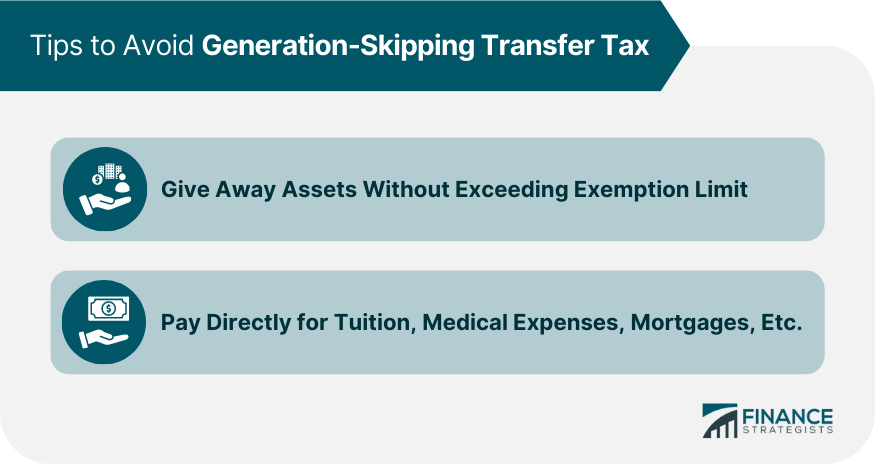The Generation-Skipping Transfer Tax is a tax on non-exempt property transferred from person to person during the transferor's lifetime or as a result of death. In most cases, this is an attempt by the United States government to collect estate taxes without the benefit of a valid estate tax credit as found in the Internal Revenue Code. It is a tax that attempts to put the same economic impact of a death tax on a non-death event, with some exceptions. Its purpose was to close up some perceived estate planning loopholes by imposing a tax on transfers intended to avoid the transferor's estate. Have a question for a Tax Consultant? Click here.
The Generation-Skipping Transfer Tax is a tax on all gifts or bequests that are made to people who are at least one generation apart. It also applies to asset transfers made to people who are more than 37.5 years younger than the transferor, with some exceptions. The GSTT also can be collected if the asset is transferred by means of a trust. A trust shall be charged with GSTT if the beneficiaries of the trust are identified as skip persons having a direct interest in the trust. The IRS normally collects gift and estate taxes on particular asset transfers that are above the limits it has set. In 2024, the lifetime gift tax exemption amount as set by the IRS is $13.61 million. This amount is being adjusted yearly particularly due to inflation and other factors. The GSTT shall be applied to any amount that surpasses the limit. The IRS has set the GSTT rate at 40%. For example, if a person is to give $100,000 to their son and $100,000 to their grandchild. With the GSTT in place, the donor cannot move more than $13.61 million tax-free through his or her lifetime. In the event that the donor has moved more than $13.61 million, then he or she will be taxed. The tax amount is calculated by multiplying 40% to the total amount that surpasses the exemption limit of $13.61 million. As mentioned earlier, one major difference between the Generation-Skipping Transfer Tax and the Estate Tax is that a Generation-Skipping Transfer Tax occurs even without the death of a person. Another difference is that, unlike the generation-skipping transfer tax, the estate tax applies to all types of property accumulated during one's life. In addition, the GSTT only affects those who give money or property to someone who is more than 37.5 years younger. There is no estate tax when a person gives money to a child, a grandchild, a great-grandchild, and so on. However, if the giver were to give money to his great-great-grandchild, then the Generation-Skipping Transfer Tax will apply. Take note that estate tax is a separate tax from the GSTT. In scenarios where GSTT is applied, a separate estate tax may also be collected. One way one can avoid the Generation-Skipping Transfer Tax is by giving away or transferring money or property before one dies. The donor may choose to transfer a part of the asset annually to his chosen beneficiary given that it does not exceed the exemption amount of $13.61 million. This way, the donor's estate tax credit will cover the amount that has been given, avoiding any additional GSTT transfer taxes. Another option is to pay directly on behalf of the beneficiary in order that taxes may be avoided. Instead of giving away a huge lump sum of money as a gift, the money can be applied as payment for certain things like tuition, medical expenses, or mortgages. To conclude, the Generation-Skipping Transfer Tax is a tax on any gift or bequest over $13.61 million that an individual makes to someone who is at least one generation apart from him or her. With this in mind, it is vital to consider how best to give money or property to all one's chosen beneficiaries in order to avoid the Generation-Skipping Transfer Tax. By transferring funds or properties before death, people can help their family members receive more money through inheritance by avoiding the Generation-Skipping Transfer Tax.What Is the Generation-Skipping Transfer Tax?
How Does Generation-Skipping Transfer Tax Work?
Generation-Skipping Transfer Tax vs Estate Tax
Tips to Avoid Generation-Skipping Transfer Tax

The Bottom Line
Generation-Skipping Transfer Tax FAQs
The exemption amount for 2024 is $13.61 million.
An estate tax is imposed on the deceased's property as part of probate proceedings and is calculated based on the value of the person's entire estate less certain deductions and exemptions.
The Generation-Skipping Transfer Tax occurs if an individual gives or bequeaths his or her property to someone who is more than 37.5 years younger than him/her.
Estate taxes are paid by the estate of the person who died, whereas generation-skipping transfer taxes are paid by the person making the gift.
Exemptions reduce taxable values and can be either "above-the-line" or "itemized." An above-the-line deduction does not require an individual to itemize his or her deductions in order to claim the exemption.
True Tamplin is a published author, public speaker, CEO of UpDigital, and founder of Finance Strategists.
True is a Certified Educator in Personal Finance (CEPF®), author of The Handy Financial Ratios Guide, a member of the Society for Advancing Business Editing and Writing, contributes to his financial education site, Finance Strategists, and has spoken to various financial communities such as the CFA Institute, as well as university students like his Alma mater, Biola University, where he received a bachelor of science in business and data analytics.
To learn more about True, visit his personal website or view his author profiles on Amazon, Nasdaq and Forbes.











